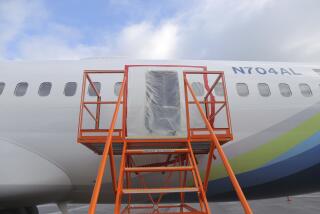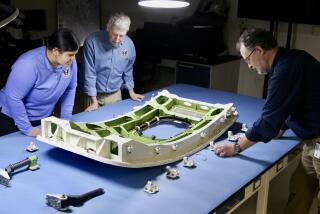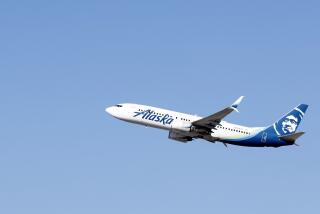Inspection of MD-11 Jetliners Ordered by FAA : Aerospace: Possible cracks in pylons raise concern of ‘unsafe condition.’ Airlines consider plane safe.
- Share via
WASHINGTON — The Federal Aviation Administration has quietly ordered airlines worldwide to inspect all McDonnell Douglas MD-11 jetliners for possible cracks in their pylons, the structures that hold the engines to the wings, The Times has learned.
The FAA described the cracks, discovered on two planes in recent weeks, as an “unsafe condition,” though it did not regard the problem as serious enough to ground the MD-11 fleet before inspections of all 130 of the 300-seat jetliners in service are completed next week.
The FAA, McDonnell and its subcontractors also are still trying to identify all MD-11 parts that were supplied by the manufacturer of the cracked pylon component to determine whether other flaws might exist.
The disclosure of the cracks came as McDonnell said it is mulling whether to halt MD-11 production for up to six months in 1996 because of a dearth of new orders for the plane, which is priced between $100 million and $125 million.
Such a shutdown would mean the furlough of several thousand workers who build the giant airplane in Long Beach, where the company’s 10,000-employee Douglas Aircraft division is based. The group also builds the MD-80 and MD-90 narrow-body airliners, but Douglas does not specify the exact number of workers devoted to each plane.
Tom Williams, a spokesman at McDonnell’s headquarters in St. Louis, emphasized that a manufacturing halt is only one of several contingency plans McDonnell is considering in case no more orders materialize for the MD-11, which began flying in 1990.
“It’s an option we haven’t ruled out, but it’s an option we don’t want to take,” he said. “That would be the last, drastic possible case.”
Douglas L. Griffith, president of United Aerospace Workers Local 148, which represents the Long Beach workers, also said he didn’t think McDonnell will shut down the line. Nor did he think McDonnell’s disclosure is a bargaining ploy in advance of contract negotiations that begin next week. The local’s contract expires April 16.
“We’re approaching the talks with an eye toward getting a contract, not toward getting into a dispute,” Griffith said.
The FAA ordered the pylon inspection in an “airworthiness directive,” saying: “Such cracking, if not detected and corrected in a timely manner, could result in reduced structural integrity of the airplane.” The order requires cracks be fixed before a plane can fly.
The inspections were ordered in late December after American Airlines, which flies 19 of the MD-11s, reported that during a routine inspection it found a four-inch crack in a pylon part known as a spar. MD-11s have two wing-mounted engines and a third in the tail.
Since then, an additional 2-inch spar crack has been identified, raising concerns that the first crack was not an isolated incident.
“It is something that is being looked at seriously, but it does not constitute a threat to the airplane,” said Douglas spokesman Don Hanson. Besides American, more than a dozen airlines use the MD-11.
Airline officials said they consider the MD-11 safe, since the problem can now be monitored through periodic inspections and eventually the spar can be strengthened or replaced. Even if a spar broke in flight, its load would be carried by other redundant structures inside the pylon, Hanson said.
American Airlines spokesman John Hotard said the flaws have had no impact on flight operations. “We are confident our periodic checks are a safe and prudent way to handle this,” he said.
Nonetheless, airlines are particularly sensitive to the issue, in part because the flaws have occurred in the same general section of the airplane faulted in the May 25, 1979, crash of a McDonnell Douglas DC-10--the MD-11’s predecessor--at Chicago’s O’Hare Airport that killed 275 people. The accident was eventually blamed on a faulty maintenance procedure that caused a section of the pylon to crack.
The cracks are occurring in a long steel spar that runs nearly the full length of the 14-foot-long pylon, which is supplied to McDonnell by Rohr Inc., said Laurence Chapman, Rohr chief financial officer
Rohr, a Chula Vista-based provider of aircraft components, buys the suspect portions of the pylon from Shin Maywa, a Japanese producer in the earthquake ravaged city of Kobe, Chapman said. The company’s facilities were seriously damaged by the earthquake and are now shut down.
Rohr officials are still trying to identify all the other parts that were supplied by Shin Maywa to determine whether other structures might be flawed, Chapman said. A preliminary probe by the FAA, McDonnell and Rohr indicates the flaw was caused by improper heat treating of the spar by a subcontractor to Shin Maywa.
The company currently has 45 firm orders for the MD-11. But in the last three years, McDonnell has recorded only two net new orders for the plane, said aerospace analyst Pierre A. Chao at Smith Barney Inc.
The company is hoping it can avoid shutting down the Long Beach operation if it can get more orders this year, find more cost savings or convince its customers expecting delivery later this decade to move their shipment dates to 1996.
A key factor in whether McDonnell proceeds with a shutdown is a pending order from Saudia, the Saudi Arabian national airline. President Clinton last year announced the Saudis would be buying about 50 aircraft from McDonnell and Boeing Co., but Saudi financial problems have so far delayed firm orders for the planes.
Nonetheless, “the Saudi order is going to get resolved this year and they’ll (McDonnell will) get a portion of that,” predicted John Harbison, aerospace director for the consulting firm Booz Allen & Hamilton.
Times staff writer Ralph Vartabedian reported from Washington and Times staff writer James F. Peltz from Los Angeles.
More to Read
Inside the business of entertainment
The Wide Shot brings you news, analysis and insights on everything from streaming wars to production — and what it all means for the future.
You may occasionally receive promotional content from the Los Angeles Times.












